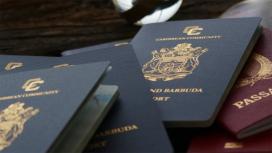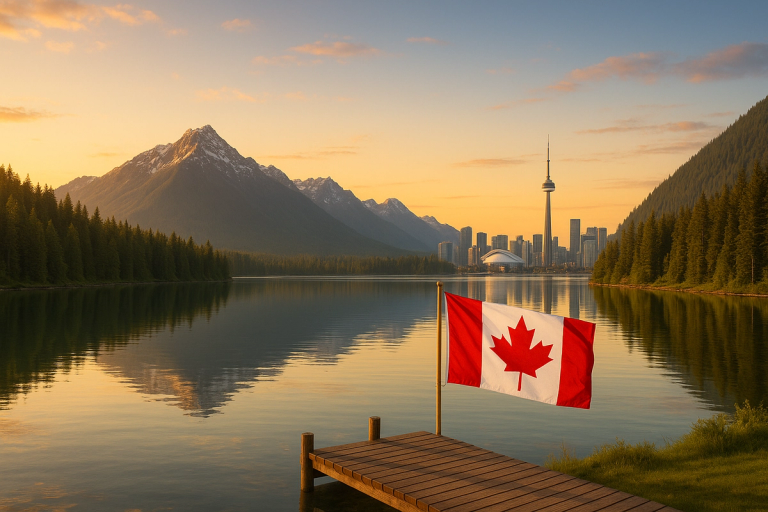Blog • Published on:December 24, 2025 | Updated on:December 24, 2025 • 13 Min
How to Invest Your Way to Canadian Citizenship
Canada does not offer a direct citizenship-by-investment program.
Instead, if you invest or establish a business in Canada, you first obtain permanent residency, and only later qualify for citizenship after meeting federal residence and integration requirements.
Canada’s system is built around economic participation over time.
Capital alone is not enough. Investment, business activity, and physical presence all form part of the pathway.
How Can Investors Obtain Permanent Residency in Canada?
Investors obtain permanent residency through approved business and investment immigration programs.
Canada’s system is designed so that capital is paired with either active business involvement or structured investment under provincial or Quebec selection frameworks.
Once you are selected at the provincial or Quebec level, you apply federally for permanent residency.
As a permanent resident, you gain the right to live, work, and operate a business in Canada, while building the residence history required for citizenship eligibility.
How Does Permanent Residency Lead to Canadian Citizenship?
Permanent residency leads to citizenship through physical presence and integration.
After obtaining permanent resident status, you must accumulate sufficient time living in Canada before applying for citizenship.
At the time of application, you are assessed on physical presence, basic language ability, and knowledge of Canada.
For investors, this creates a predictable timeline: first permanent residency, then residence accumulation, followed by eligibility to apply for a Canadian passport.
Advisory note
Savory & Partners advises investors on structuring compliant Canadian investment and business immigration strategies, from permanent residency planning through to citizenship eligibility.
Which Canada Investment and Business Immigration Programs Are Available Today?
Canada’s investor-led immigration routes operate primarily through provincial programs and Quebec’s separate selection system.
There is no single national investor visa. Instead, you choose a pathway based on how you plan to deploy capital and participate economically.
As of today, the relevant options for investors are provincial entrepreneur streams and Quebec’s investor pathway.
What Is the Quebec Immigrant Investor Program?
The Quebec Immigrant Investor Program is Canada’s only investor-focused route based on a structured investment.
Under this program, qualifying investors make a government-backed investment through an approved financial intermediary and apply for Quebec selection.
Once selected by Quebec, you submit a federal application for permanent residency.
This route is typically considered by HNWIs who prefer a defined investment structure rather than operating a business day to day.
Program intake is limited and subject to periodic adjustments, so timing and eligibility assessment matter.
Which Provincial Entrepreneur Programs Suit Investors Best?
Provincial Nominee Program entrepreneur streams are designed for investors who want to operate a business in Canada.
These programs are run by individual provinces and target applicants who plan to establish, acquire, or expand a business while residing locally.
Each province sets its own criteria based on economic priorities, but the structure is broadly consistent across Canada.
Investors typically use these programs when they want direct involvement in business operations and a clear route to permanent residency.
How Do Provincial Entrepreneur Programs Work in Practice?
You invest capital, actively manage a business, and meet agreed performance conditions before permanent residency is granted.
Most provincial entrepreneur programs follow a staged approach. You are first approved in principle, then enter Canada to implement your business plan.
Permanent residency is issued only after you demonstrate that the required investment and operational commitments have been met.
Common elements across provinces include:
- a qualifying investment tied to a real operating business
- active, ongoing management by you as the applicant
- job creation for Canadian citizens or permanent residents
- a performance agreement that defines timelines and obligations
This structure links immigration outcomes to measurable economic activity.
Comparison: Canada Investor and Business Immigration Options
What Are the Investment Requirements for Canada Investor Immigration?
Investment requirements depend on the program and the province, but they are clearly defined and measurable.
Canada does not apply a single national investment threshold.
Instead, requirements are set by provinces and by Quebec, based on local economic priorities and the type of contribution expected from you as an investor.
How Much Do Investors Need to Invest in Canada?
Most investor-led routes require an investment between CAD 150,000 and CAD 600,000.
In practice:
- Provincial entrepreneur programs usually require CAD 150,000–250,000 in smaller or regional provinces
- In major markets such as British Columbia or Ontario, investment levels typically start from CAD 200,000 and can reach CAD 600,000, depending on the business model
- Quebec’s investor program requires a significantly higher capital commitment through a structured investment mechanism
The investment must be directly linked to an operating business or an approved investment structure and cannot be passive cash holding.
What Net Worth Do Investors Need to Demonstrate?
You must show sufficient legally acquired net worth to support both the investment and your settlement in Canada.
Typical expectations are:
- CAD 500,000+ net worth for most provincial entrepreneur programs
- Higher net worth thresholds for Quebec’s investor pathway
Net worth is assessed holistically and can include business ownership, real estate, financial assets, and long-term savings, provided the source can be clearly documented.
How Is Source of Funds Assessed by Canadian Authorities?
You are required to prove that your funds were obtained lawfully and over time.
Authorities will usually request documentation showing:
- business income and retained earnings
- sale of companies or shares
- property transactions
- dividends, investments, or accumulated savings
Clear source-of-funds documentation is one of the most critical elements of a successful application and is closely reviewed at both provincial and federal stages.
What Are the Business Experience Requirements?
Investor-led programs expect you to have relevant ownership or senior management experience.
Most programs assess whether you have:
- managed a business or department
- held decision-making authority
- experience aligned with the proposed Canadian business
This requirement exists to ensure that the business plan is realistic and that you can actively operate or oversee the investment after arrival.
Are Job Creation and Active Management Mandatory?
Active management is required under provincial entrepreneur programs.
If you apply through a provincial entrepreneur stream, you are generally expected to:
- participate directly in day-to-day or strategic management
- create at least one full-time job for a Canadian citizen or permanent resident
Quebec’s investor route is structured differently and does not require job creation, as it is based on a defined investment rather than business operation.
Advisory note
Savory & Partners works with investors to assess realistic investment levels, prepare source-of-funds documentation, and align business plans with provincial and Quebec program requirements.
What Is the Timeline from Investment to Canadian Citizenship?
Canada does not apply a fixed timeline for investors. The process is sequential.
While each stage of the journey is clearly defined, the time required to move through it depends on the program selected, the province involved, and how program conditions are fulfilled.
Across all investor-led pathways, the progression follows the same structure:
- approval under a provincial or Quebec investment or business program
- completion of required business or investment conditions, where applicable
- grant of permanent resident status
- accumulation of physical presence in Canada
- eligibility to apply for Canadian citizenship
Citizenship eligibility is governed by federal law and is assessed based on residence, language ability, and compliance.
It is not determined by investment size or business performance once permanent residency has been granted.
How Long Should You Live in Canada Before Citizenship?
You must be physically present in Canada for at least 1,095 days within a five-year period.
This is a federal requirement and applies to all permanent residents, including investors.
Days do not need to be consecutive, but only physical presence in Canada counts toward eligibility.
Permanent resident status must also be maintained during this period.
What Requirements Apply at the Citizenship Stage?
Citizenship is assessed on residence, language, and compliance.
At the time of application:
- applicants aged 18–54 must demonstrate basic English or French ability
- a citizenship knowledge test applies to most adult applicants
- personal tax filings must be up to date for the required years
Investment size or business success is not reassessed at this stage.
Can Investors Move to Canada Before Permanent Residency?
Yes. Investors can relocate to Canada before permanent residency through approved business mobility routes.
This option is commonly used when you want to establish operations, oversee a business, or enter the market earlier, while preparing a longer-term permanent residency strategy in parallel.
What Is the Canada Intra-Company Transfer (ICT) Pathway?
The ICT pathway allows business owners and senior managers to move to Canada under a work permit.
If you own or manage an active foreign company, ICT can be used to transfer you to a Canadian branch, subsidiary, or newly established entity.
The permit is issued under Canada’s International Mobility Program and is employer specific.
This route is often used by investors expanding an existing business into Canada.
What Are the Key Requirements for the ICT Route?
You must demonstrate a real business relationship and active operations.
In practice, authorities assess:
- ownership or senior management role in the foreign company
- a genuine connection between the foreign entity and the Canadian business
- sufficient capitalisation to operate the Canadian entity
- a viable business plan with real economic activity
There is no fixed minimum investment, but undercapitalised or inactive structures are not accepted.
Does ICT Lead Directly to Permanent Residency or Citizenship?
ICT does not grant permanent residency or citizenship on its own.
ICT is a temporary work permit, typically issued for one to three years. Permanent residency is pursued separately, often through:
- a provincial entrepreneur program
- another eligible economic immigration pathway
Citizenship becomes possible only after permanent residency is obtained and residence requirements are met.
When Does ICT Make Sense for Investors?
ICT is most suitable when you already operate an established business outside Canada.
It is commonly used when:
- you want to oversee Canadian operations personally
- the business requires on-the-ground leadership
- you plan to transition into a permanent residency route later
For investor-led planning, ICT is usually a tactical entry step, not the end goal.
Advisory note
You can apply for the Canada Intra-Company Transfer (ICT) route through Savory & Partners, with professional support covering company structuring, eligibility assessment, and planning the transition from work permit to permanent residency.
What Other Legal Paths Lead To Canadian Citizenship?
Canadian citizenship can also be reached through non-investment routes, provided permanent residency is obtained first.
These pathways are separate from investor and business immigration programs, but they follow the same end requirement: permanent residency followed by residence and integration in Canada.
Can Skilled Immigration Lead to Canadian Citizenship?
Yes. Skilled immigration is one of the most common routes to Canadian citizenship.
Through systems such as Express Entry and provincial skilled worker programs, qualified professionals can obtain permanent residency based on education, work experience, language ability, and labour market needs.
Once permanent residency is granted, citizenship eligibility follows the same residence rules as for investors.
Can Family Sponsorship Lead to Canadian Citizenship?
Yes. Family sponsorship can lead to citizenship after permanent residency is granted.
Canadian citizens and permanent residents can sponsor eligible family members, including spouses, partners, children, parents, and grandparents.
Sponsored individuals first obtain permanent residency and may later apply for citizenship after meeting federal residence and integration requirements.
Can Studying in Canada Lead to Citizenship?
Yes, but through a multi-step process.
International students do not obtain citizenship directly. The typical progression is:
- study in Canada
- obtain a post-graduation work permit
- qualify for permanent residency through a skilled immigration program
- apply for citizenship after meeting residence requirements
This route is commonly used by younger applicants planning long-term settlement.
Is Canadian Citizenship Available by Birth or Descent?
Yes, under specific conditions.
Citizenship may be granted automatically if:
- a child is born in Canada, subject to limited exceptions
- a child is born abroad to a Canadian citizen parent, depending on generation and status
These routes are governed by federal citizenship law and are not connected to investment or business activity.
What Advantages Does Canadian Citizenship Offer Investors and Families?
Healthcare and social protection
Citizens have full access to Canada’s publicly funded healthcare system, covering hospital care and essential medical services nationwide.
Citizenship also provides eligibility for public pensions, unemployment support, and long-term social security benefits, which becomes particularly relevant for family and retirement planning.
Global mobility
A Canadian passport allows visa-free or visa-on-arrival travel to over 180 countries, including the United States, the European Union, the United Kingdom, Japan, and Australia.
For investors with international operations, this significantly reduces travel restrictions and administrative friction.
Education benefits
Children of Canadian citizens can attend public primary and secondary schools without international fees.
At the university level, citizens pay domestic tuition rates, which are substantially lower than international student fees, and gain access to local admissions pathways and funding options.
Business and investment freedom
Citizenship removes immigration-related constraints on business activity.
Investors can operate, expand, or restructure businesses anywhere in Canada without relying on visas or work permits, while benefiting from Canada’s stable banking system, transparent corporate regulations, and access to North American markets under USMCA.
Permanent status
Unlike temporary visas or permanent residency, citizenship is not subject to renewal or residence compliance.
This provides certainty for long-term business planning, asset structuring, and family settlement.
What Business and Investment Factors Should Investors Consider in Canada?
Beyond immigration requirements, investors need to assess where and how to operate a viable business in Canada.
The choice of sector and location matters not only for commercial success, but also for alignment with provincial priorities under entrepreneur and business immigration programs.
In practice, investor-led businesses in Canada are most commonly established in:
1. Technology and innovation: Software, AI, fintech, and life sciences are strongly supported in major urban centres and frequently align with provincial economic objectives.
2. Healthcare and medical services: Clinics, care services, and health-related businesses benefit from consistent demand and regulated operating environments.
3. Agriculture and agri-business: Food production, processing, and agri-tech are particularly relevant in provinces such as Saskatchewan, Alberta, and Manitoba.
4. Energy and industrial services: Clean energy, industrial support services, and related sectors remain relevant in Western Canada.
From a location perspective, investors often focus on:
- Toronto for finance, technology, and professional services
- Vancouver for trade-oriented businesses and Asia-Pacific access
- Montreal for research-driven industries and innovation
- Western provinces for agriculture, energy, and industrial activity
Selecting a business activity that fits both market demand and provincial priorities supports long-term operational stability.
What Legal and Operational Obligations Apply After Investment?
Once a business is established, investors are expected to comply with Canadian corporate and employment requirements.
Key considerations typically include:
- incorporating the business federally or at the provincial level, depending on scope of operations
- registering the business name and obtaining required licences
- complying with employment standards once staff are hired
For investors applying through provincial entrepreneur programs, additional obligations usually apply.
FAQs About Investing in Canada
How long must I live in Canada before applying for citizenship?
You must be physically present in Canada for at least 1,095 days within a five-year period.
These days do not need to be consecutive. Only time spent physically in Canada as a permanent resident counts toward eligibility.
What is the minimum investment amount to obtain Canadian citizenship?
There is no direct investment amount for citizenship.
Investment thresholds apply at the permanent residency stage, through provincial entrepreneur programs or Quebec’s investor pathway.
Citizenship eligibility is based on residence and integration, not capital size.
Can my family be included in my investment or business immigration application?
Yes. Spouses and dependent children are typically included.
Once permanent residency is granted, your spouse can work in Canada, your children can study, and your family can access public healthcare and education under the same status.
Do I need to stay in the province that nominated me?
Yes, during the entrepreneur and nomination stage.
Provincial programs expect you to establish and operate your business in the nominating province.
After permanent residency and sufficient residence history, mobility rights increase.
Can I apply for citizenship if my business is no longer operating?
Yes, if you already hold permanent residency and meet citizenship requirements.
Citizenship is assessed on physical presence, language ability, and compliance, not on the ongoing performance of the original business.
Are Canadian residents taxed on worldwide income?
Yes. Canadian tax residents are generally taxed on worldwide income.
However, Canada has an extensive network of tax treaties that help prevent double taxation. Proper tax planning before relocation is strongly recommended.
Is the Canada ICT route a shortcut to citizenship?
No. ICT is a work-permit route, not a citizenship or PR program.
It can be used as an entry strategy for business owners, but permanent residency and citizenship must be pursued through separate, eligible programs.
References
Government of Canada. (2025). Citizenship eligibility requirements. Immigration, Refugees and Citizenship Canada.Referred from: https://www.canada.ca/citizenship-eligibility
Government of Quebec. (2025). Immigrant Investor Program conditions. Gouvernement du Québec. Referred from: https://www.quebec.ca/immigrant-investor
Government of Canada. (2025). Provincial Nominee Program (PNP). Immigration, Refugees and Citizenship Canada. Referred from: https://www.canada.ca/provincial-nominees
Government of Canada. (2025). Intra-Company Transfer (ICT) program. Immigration, Refugees and Citizenship Canada. Referred from: https://www.canada.ca/intra-company-transfer
Written By

Laura Weber
Laura Weber is a legal expert in international tax planning and citizenship by investment. With over a decade of experience, Laura helps individuals and families navigate complex legal frameworks to secure dual citizenship and global residency options, particularly in the Caribbean and Europe.
Related Articles









Recently Published









Book a free consultation


